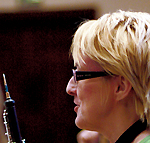
Reviews
Conductor Richard Jenkinson captured the varied moods in this striking piece [Haydn's Nelson Mass] with consummate skill: cheerfulness for the Benedicite, reckless verve in the Et Resurrexit, devotional tones in the Sanctus and deftness in the accompaniment to the soaring roulades of soloist Claire Prewer.
![]() Jim Page, Bromsgrove Arts News, March 2014 full review
Jim Page, Bromsgrove Arts News, March 2014 full review

This is the ultimate challenge for any orchestra and singer, yet in the Parish Church we had in Claire Prewer a soprano who was able to mount that challenge with singing of incredible power and, supported by playing of the utmost passion from the orchestra and inspired leadership from Richard Jenkinson, the tragic intensity of the music, its pathos and sheer sensuous beauty overwhelmed the audience.
![]() Jim Page, Bromsgrove Arts News, October 2013 full review
Jim Page, Bromsgrove Arts News, October 2013 full review
Local music making at its very best. Some lovely woodwinds, particularly oboe and flute solo strands, offset rich brass and heroic horns, creating imaginative drama and inspired playing throughout.
![]() Maggie Cotton, Birmingham Post, July 2012 ***** full review
Maggie Cotton, Birmingham Post, July 2012 ***** full review
Congratulations on an amazing weekend! Bromsgrove has seen nothing like last night's concert for many years. There was such a buzz of enjoyment, amazement and excitement in the audience. Cheering in the Parish church? Unheard of! But my goodness Benjamin Frith and you all deserved it. I loved both the Beethovens (Mozart a little too hard driven for my taste!) and the spirit of that amazing genius shone through every bar. And how fantastic to have natural horns whooping it up with such skill. Amazing oboe playing - all those wonderful solos shone through luminously - and clarinets weren't bad either! Loved the way they were given their head to gurgle contentedly in the last movement. So many conductors let that variation pass for nothing.
![]() A member of the audience, by email, July 2012
A member of the audience, by email, July 2012
Diction [of Mozart's Requiem] was well-prepared, attack and tone were fearless, and the 'Kyrie' fugue was given with freshness and vigour. The compact orchestra itself did a splendid job, and it was so good to hear the counterpoint of the trombone-trio with such clarity.
![]() Christopher Morley, Birmingham Post, April 2012 *** full review
Christopher Morley, Birmingham Post, April 2012 *** full review

This is a neat, tidy and fearless little orchestra, reliable in intonation, and with a strong bass-line presence from so few players which was not just due to this excellent acoustic. ...it was in Tchaikovsky’s neo-classical Serenade for Strings, which the players delivered with sensitivity and gossamer clarity. ...Jenkinson securing seamless tempo changes, and making one emphatic point with a thumping cricketing-drive [in Elgar’s Introduction and Allegro].
![]() Christopher Morley, Birmingham Post, December 2011 **** full review
Christopher Morley, Birmingham Post, December 2011 **** full review
